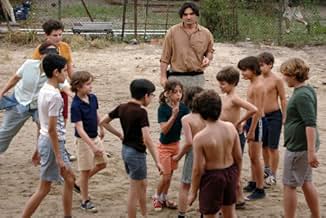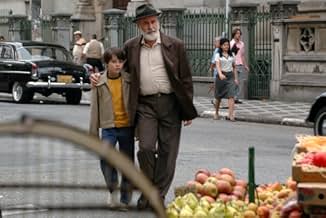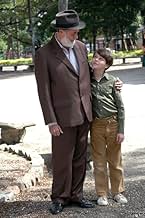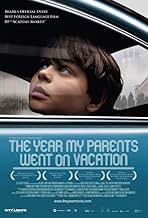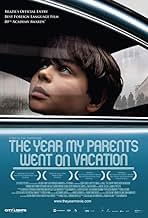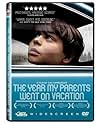IMDb-BEWERTUNG
7,3/10
6808
IHRE BEWERTUNG
Füge eine Handlung in deiner Sprache hinzuA boy is left alone in a Jewish neighborhood in 1970, when the World Cup coincides with political crackdowns by the military dictatorship.A boy is left alone in a Jewish neighborhood in 1970, when the World Cup coincides with political crackdowns by the military dictatorship.A boy is left alone in a Jewish neighborhood in 1970, when the World Cup coincides with political crackdowns by the military dictatorship.
- Auszeichnungen
- 32 Gewinne & 38 Nominierungen insgesamt
Empfohlene Bewertungen
In 1970, near the World Cup, Daniel Stern (Eduardo Moreira) and his wife Miriam (Simone Spoladore) leaves Belo Horizonte in a hurry and scared with their ten years old son Mauro (Michel Joelsas) in their Volkswagen. While traveling to São Paulo, the couple explains Mauro that they will travel on vacation and will leave Mauro with his grandfather Mótel (Paulo Autran). Daniel promises to return before the first game of the Brazilian National Soccer Team in the Cup. The boy is left in Bom Retiro, a Jewish and Italian neighborhood, and waits for Mótel in front of his apartment. When the next door neighbor Shlomo (Germano Haiut) arrives, he tells the boy that Mótel had just had a heart attack and died. Alone and without knowing where his parents are, the boy is lodged by Shlomo and the Jewish community. Through the young neighbor Hanna (Daniela Piepszyk), Mauro makes new friends, cheers for the Brazilian team and sees the movement of the police and militaries on the streets while waiting for his parents.
In 1970, 90 millions of Brazilians were cheering for the National Soccer Team in the World Cup while the dictatorship had the toughest and cruelest moment against the opposition. I found this touching and sensitive movie amazing, since the director Cao Hamburger was able to brilliantly work with amateurish children and achieve outstanding performances, exposing the political situation of that milestone of Brazilian contemporary history through the eyes of a middle-class boy of ten years old. For me, it is absolutely impressive because I had approximately the same age of Mauro in 1970 and I lived that moment going to school, playing soccer and buttons, going to the beach and to the movie theater and cheering for our National Soccer Team without knowing or understanding clearly what was happening. The story is very simple and dramatic, but never corny, and the very convincing performances of the cast is awesome and touching. Michel Joelsas and Daniela Piepszyk have key roles in the story and I dare to write that two stars are born. My vote is ten.
Title (Brazil): "Ano em Que Meus Pais Saíram de Férias, O" ("The Year When My Parents Went on Vacation")
In 1970, 90 millions of Brazilians were cheering for the National Soccer Team in the World Cup while the dictatorship had the toughest and cruelest moment against the opposition. I found this touching and sensitive movie amazing, since the director Cao Hamburger was able to brilliantly work with amateurish children and achieve outstanding performances, exposing the political situation of that milestone of Brazilian contemporary history through the eyes of a middle-class boy of ten years old. For me, it is absolutely impressive because I had approximately the same age of Mauro in 1970 and I lived that moment going to school, playing soccer and buttons, going to the beach and to the movie theater and cheering for our National Soccer Team without knowing or understanding clearly what was happening. The story is very simple and dramatic, but never corny, and the very convincing performances of the cast is awesome and touching. Michel Joelsas and Daniela Piepszyk have key roles in the story and I dare to write that two stars are born. My vote is ten.
Title (Brazil): "Ano em Que Meus Pais Saíram de Férias, O" ("The Year When My Parents Went on Vacation")
10aharmas
Seldom does a film capture the essence of a period without sacrificing its soul. Hollywood works wonders with its budgets to recreate a long gone era, but most of those production offer empty shells, without much to care for. True, at their best, they carry a single emotion forward, and when its loud most of notice, but we leave without much emotional investment. This film stays inside your heart because it reaches deep with its message, with the purity of its storytelling, and most importantly with the powerful and yet quiet delivery of the its main performers.
Here there are no breathtaking special effects, but we keep catching our breath, as we follow the tale of a boy who must soon realize his life will never be the same. Pivotal events occur right before he must enter the traumatic stage of adolescence. There is still much wonder in his spirit, and his innocence is still pretty much in effect, as he captures the hearts and sympathy of people who barely know him. He is not a precocious youngster, only one who suddenly faces a crisis that he is not able to truly understand.
Eventually, as the film reaches its climax, his use of language demonstrates he has grown up. His silences represent a new understanding. Yet as he leaves us, we know he will always recall this special time in his life with much affection and wonder, and those qualities are so vivid throughout the movie that it is hard to dismiss this film as just another children's movie. It is heavily dependent on the very good work of two young performers, but it is ahaded with political references, with nostalgic touches of long gone eras, so we are enveloped by those powerful emotions, and yet, we know that what we are witnessing is part of our fabric and they will eventually recycle to create more stories like these. It is a very personal movie, one that should be commended by its ability to provide us with an exquisite sense of detail, with careful appreciation of the cultural forces that make a community, and the common bounds that we have in our different communities.
This just happens to be Brazil, a world that is always vibrant and admired by its contributions to world culture, a country long associated with soccer, that is now showing another facet of its multicultural fabric: a Jewish community. However, this is just another sweet element in the mix, one that serves as the background of a world that is ever changing, a world pulled apart by forces, and yet with an ability to heal and grow.
Mauro is not an observant, but he is a witness to turmoil that he doesn't understand. He is consistent and determined, never giving up on the hope he will see his parents again. There is no heartbreak, but we see how he at times needs to release his frustration and pain. There are no emotional fireworks, but great displays of how strong a common event can cross borders and ethnic differences, and for a while unite us all. Mauro shows us how a child thinks and behaves, how he is forced to understand and grow, even when he is not really ready, yet.
The movie is delicate, never loud, never too obvious in its delivery. The direction is subtle and masterful, never yelling at us, and never showing us demonic portrayals to show us the evil that exists in our world. Here is a director that can makes us appreciate the sense of loss, the beauty of transformation and growth, the agony of hopelessness, and a myriad of feelings that few movies in Hollywood can ever do.
Only one question remains: Why was this film ignored and not included in the Foreign film category? It is released early in this year, on its way to be a forgotten jewel in the world of cinema, with no chance at recognition much later because inexplicable oversight and bias is now delivering a message that unless not so subtle advertising and careful placement in the last three months of the year, a film is not worth the recognition it would otherwise deserve. It is time that the agency that so call recognizes quality in the art of cinema revamps a system that is now going stale and is truly disappointing those of us who really love good movies whenever they arrive and whatever genre and origin they might be. This film is indeed a sweet vacation from a very crowded and loud world.
Here there are no breathtaking special effects, but we keep catching our breath, as we follow the tale of a boy who must soon realize his life will never be the same. Pivotal events occur right before he must enter the traumatic stage of adolescence. There is still much wonder in his spirit, and his innocence is still pretty much in effect, as he captures the hearts and sympathy of people who barely know him. He is not a precocious youngster, only one who suddenly faces a crisis that he is not able to truly understand.
Eventually, as the film reaches its climax, his use of language demonstrates he has grown up. His silences represent a new understanding. Yet as he leaves us, we know he will always recall this special time in his life with much affection and wonder, and those qualities are so vivid throughout the movie that it is hard to dismiss this film as just another children's movie. It is heavily dependent on the very good work of two young performers, but it is ahaded with political references, with nostalgic touches of long gone eras, so we are enveloped by those powerful emotions, and yet, we know that what we are witnessing is part of our fabric and they will eventually recycle to create more stories like these. It is a very personal movie, one that should be commended by its ability to provide us with an exquisite sense of detail, with careful appreciation of the cultural forces that make a community, and the common bounds that we have in our different communities.
This just happens to be Brazil, a world that is always vibrant and admired by its contributions to world culture, a country long associated with soccer, that is now showing another facet of its multicultural fabric: a Jewish community. However, this is just another sweet element in the mix, one that serves as the background of a world that is ever changing, a world pulled apart by forces, and yet with an ability to heal and grow.
Mauro is not an observant, but he is a witness to turmoil that he doesn't understand. He is consistent and determined, never giving up on the hope he will see his parents again. There is no heartbreak, but we see how he at times needs to release his frustration and pain. There are no emotional fireworks, but great displays of how strong a common event can cross borders and ethnic differences, and for a while unite us all. Mauro shows us how a child thinks and behaves, how he is forced to understand and grow, even when he is not really ready, yet.
The movie is delicate, never loud, never too obvious in its delivery. The direction is subtle and masterful, never yelling at us, and never showing us demonic portrayals to show us the evil that exists in our world. Here is a director that can makes us appreciate the sense of loss, the beauty of transformation and growth, the agony of hopelessness, and a myriad of feelings that few movies in Hollywood can ever do.
Only one question remains: Why was this film ignored and not included in the Foreign film category? It is released early in this year, on its way to be a forgotten jewel in the world of cinema, with no chance at recognition much later because inexplicable oversight and bias is now delivering a message that unless not so subtle advertising and careful placement in the last three months of the year, a film is not worth the recognition it would otherwise deserve. It is time that the agency that so call recognizes quality in the art of cinema revamps a system that is now going stale and is truly disappointing those of us who really love good movies whenever they arrive and whatever genre and origin they might be. This film is indeed a sweet vacation from a very crowded and loud world.
Coming of age tales seem to be old fashioned, perhaps because we've already got so many of these stories that they all seem the same. "Amarcord" (perhaps the least conventional coming of age film ever made - but what would you expect from Federico Fellini's reminiscences?), "Pelle, the Conqueror", "My Life as a Dog", "Summer of '42" and "Radio Days", just to name a few, are unforgettable films. Naturally, these stories tend to repeat old clichés, but every now and then we get a fresh and sincere coming of age film, even if it's not innovative or particularly original. "O Ano em que Meus Pais Saíram de Férias" aka "The Year My Parents Went on Vacation" is one of those. It's not in the same level as the gems I mentioned, but it's delicate and touching.
Brazil, 1970: military dictatorship haunts the nation, and 12 year-old Mauro (Michel Joelsas) is sent to live in São Paulo with his grandfather (Paulo Autran), when his parents go "on vacation". While he waits for his parents to come back, Mauro roots for Brazil to win the FIFA World Cup for the third time. The movie resembles two good recent flicks, "Kamchatka" (Argentina, 2002) and "The Miracle of Bern" (Germany, 2003), in the way it has dictatorship and soccer at the core of their stories. Without being a masterpiece, "O Ano em que Meus Pais Saíram de Férias" is a nostalgic piece about an important time in Brazilian history. Besides, it was Paulo Autran's (one of, if not THE, greatest Brazilian actors of all time) last movie - an extra reason to check it. 8/10.
Brazil, 1970: military dictatorship haunts the nation, and 12 year-old Mauro (Michel Joelsas) is sent to live in São Paulo with his grandfather (Paulo Autran), when his parents go "on vacation". While he waits for his parents to come back, Mauro roots for Brazil to win the FIFA World Cup for the third time. The movie resembles two good recent flicks, "Kamchatka" (Argentina, 2002) and "The Miracle of Bern" (Germany, 2003), in the way it has dictatorship and soccer at the core of their stories. Without being a masterpiece, "O Ano em que Meus Pais Saíram de Férias" is a nostalgic piece about an important time in Brazilian history. Besides, it was Paulo Autran's (one of, if not THE, greatest Brazilian actors of all time) last movie - an extra reason to check it. 8/10.
O ano em que meus pais sairam de férias is Cão Hamburger's rather spectacular debút into the area of feature-length films for adult audiences.
Set mostly in the São Paulo neighborhood of Bom Retiro during the 1970 World Cup (and also, not coincidentally, during the "Iron Years" of the last Brazilian military dictatorship), the film tells the story of Mauro (Michel Joelsas), a boy from the state of Minas Gerais who is dropped off in front of the São Paulo apartment of his Jewish grandfather when his parents are forced to hide from the political police. When Mauro arrives, he finds that his grandfather has recently passed away and Mauro is left virtually alone as he waits out his parents' "vacation". In the process, the boy forms an alternative family consisting of the orthodox Jewish immigrant community of his grandfather, a group of neighborhood children including Hanna (spectacularly played by Daniela Piepszyk) and the attractive anarchist Ítalo (Caio Blat). Bom Retiro also discovers Mauro: this son of political activists is Jewish only in heritage and is much more interested in football than anything else.
Indeed, in Hamburger's world, football is the one uniting aspect of Brazilian society. From the apolitical orthodox rabbis to the black goalie on the Jewish football team to the Italians to the anti-dictatorship guerrillas, the one thing that unites everyone is the game. In a São Paulo that is usually defined by its immigrants and work ethic, everything stops for World Cup games and neighborhood matches. In this way, the film is not so much the story of youth in the dictatorship (as is the case with the Chilean Machuca and the Argentine Kamchatka) but rather a story set in that time and a circumstance created by the dictatorship. Instead, it is Hamburger's attempt to describe Brazilian society through the lens of what is, on the surface, the most unusual of Brazilian settings: one of the Jewish neighborhoods of São Paulo. In this world, people of many races, ethnicities and religions mix, united by football even as they are divided by culture. Another factor that unites them is that nearly all of the characters are not particularly tied to politics or concerned with the dictatorship. Indeed, like most people across classes, these characters are much more concerned with providing for their families and even improving their situations. Fighting the political situation becomes a sort of fringe activity that is the "luxury" of youths like Ítalo and ultimately the folly of "responsible adults" like Mauro's parents. It is not that Hamburger advocates this stance but rather that he sees the historical truth that few actively fought against the dictatorship while the great majority silently tried to ignore ituntil it invaded their own lives. As such, the film is a quiet tragedy.
Visually, the film is quite lovely thanks to the cinematography of Adriano Goldman. Shot mostly with small hand-held cameras in close quarters, the film has an intimacy and silence that is intense without being cheesy. Lit in tones of blues and greens and seamlessly edited by Daniel Rezende (Motorcycle Diaries, City of God), it is almost surprisingly well-made for such a "small" film. Finally, it is worth noting that Hamburger did an excellent job casting and working with the youthful and largely inexperienced actors.
Set mostly in the São Paulo neighborhood of Bom Retiro during the 1970 World Cup (and also, not coincidentally, during the "Iron Years" of the last Brazilian military dictatorship), the film tells the story of Mauro (Michel Joelsas), a boy from the state of Minas Gerais who is dropped off in front of the São Paulo apartment of his Jewish grandfather when his parents are forced to hide from the political police. When Mauro arrives, he finds that his grandfather has recently passed away and Mauro is left virtually alone as he waits out his parents' "vacation". In the process, the boy forms an alternative family consisting of the orthodox Jewish immigrant community of his grandfather, a group of neighborhood children including Hanna (spectacularly played by Daniela Piepszyk) and the attractive anarchist Ítalo (Caio Blat). Bom Retiro also discovers Mauro: this son of political activists is Jewish only in heritage and is much more interested in football than anything else.
Indeed, in Hamburger's world, football is the one uniting aspect of Brazilian society. From the apolitical orthodox rabbis to the black goalie on the Jewish football team to the Italians to the anti-dictatorship guerrillas, the one thing that unites everyone is the game. In a São Paulo that is usually defined by its immigrants and work ethic, everything stops for World Cup games and neighborhood matches. In this way, the film is not so much the story of youth in the dictatorship (as is the case with the Chilean Machuca and the Argentine Kamchatka) but rather a story set in that time and a circumstance created by the dictatorship. Instead, it is Hamburger's attempt to describe Brazilian society through the lens of what is, on the surface, the most unusual of Brazilian settings: one of the Jewish neighborhoods of São Paulo. In this world, people of many races, ethnicities and religions mix, united by football even as they are divided by culture. Another factor that unites them is that nearly all of the characters are not particularly tied to politics or concerned with the dictatorship. Indeed, like most people across classes, these characters are much more concerned with providing for their families and even improving their situations. Fighting the political situation becomes a sort of fringe activity that is the "luxury" of youths like Ítalo and ultimately the folly of "responsible adults" like Mauro's parents. It is not that Hamburger advocates this stance but rather that he sees the historical truth that few actively fought against the dictatorship while the great majority silently tried to ignore ituntil it invaded their own lives. As such, the film is a quiet tragedy.
Visually, the film is quite lovely thanks to the cinematography of Adriano Goldman. Shot mostly with small hand-held cameras in close quarters, the film has an intimacy and silence that is intense without being cheesy. Lit in tones of blues and greens and seamlessly edited by Daniel Rezende (Motorcycle Diaries, City of God), it is almost surprisingly well-made for such a "small" film. Finally, it is worth noting that Hamburger did an excellent job casting and working with the youthful and largely inexperienced actors.
Twelve-year-old Mauro (Michel Joelsas) is a soccer fan who spends hours playing table soccer in his suburban home in Belo Horizonte, Brazil and fantasizes about playing soccer with Pelé and Tostao, the heroes of the Brazilian soccer team that is about to compete for its third World Cup title. He hardly even blinks when his parents tell him that they are going on vacation and will be dropping him off at his grandfather's apartment in Sao Paolo. Brazil's official submission for the 2008 Oscars in the Best Foreign Film category, The Year My Parents Went on Vacation contains all the ingredients for a Hollywood-style exercise in cliché-ridden sentimentality an adorable young boy, a cantankerous but wise old man, and a world-class sports tournament. Yet director Cao Hamburger meshes these elements into a film that is nuanced, honest, and genuinely touching and, in the process, shows how an attitude of welcoming hospitality can make a difference in the lives of those who feel abandoned.
Set in Brazil in 1970 against a backdrop of military dictatorship, Mauro's father (Eduardo Moreira) and Catholic mother (Simone Spoladore) have been forced to go underground because of their political opposition to the government of General Emilio Medici, a military dictator but do not reveal to Mauro the truth about their leaving. Telling the boy that they will come back for him before the start of the World Cup Soccer Tournament, they deliver him to the home of his grandfather Motel (Paulo Autran) in the mostly Jewish Bom Retiro district of Sao Paulo but do not realize that grandpa has just died of a heart attack in his barbershop.
Tired of waiting for his grandfather to return, Mauro enlists the help of a neighbor, an aging Jewish bachelor Shlomo (Germano Haiut) who reluctantly takes him in but is not happy with his newfound task of caring for the youngster. He chastises the boy after he rejects eating herring for breakfast and slaps him across the face when he plays soccer in the hallways while wearing his prayer shawl. Shlomo becomes even more petulant when he inadvertently discovers that Mauro (whom he has been calling Moishela) is a "goy" who has not been circumcised (a very unlikely event when there is a Jewish father). It is only when the rabbi tells him that, like Moses, Mauro has been left on his doorstep by God that he begins to treat Moishela with respect and invites members of the local synagogue to offer him lunch each day at their different apartments.
Mauro's love of soccer helps him to befriend the local Jewish children, forming a bond with adorable 11-year-old Hanna (Daniela Piepsyk) and the community of Italian, Greek and Arab immigrants who are united in their devotion to the Brazilian soccer team. Joelsas is excellent as the highly intelligent energetic boy who must adapt to a strange environment far removed from his familiar surroundings. The film is almost stolen, however, by Piepsyk as the tomboyish Hanna who collects money from the boys to give them a peek at women trying on clothes in her mother's dress shop. When the World Cup begins, however, all the attention in the neighborhood is on soccer but for Mauro, it is mostly a reminder of his parents promise to return.
Spoken mostly in Yiddish, The Year My Parents Went on Vacation contains elements of The Cup, Running on Empty, and Under the Same Moon, but distinguishes itself by the freshness of its light-hearted approach and the outstanding performances of its mostly non-professional actors. Though not primarily a political coming-of-age film, when Hamburger deftly shifts from a rock n' roll dance floor to the sound of fascist soldiers on horseback making arrests of suspected dissidents, it is a jarring introduction to a young man's loss of innocence.
Set in Brazil in 1970 against a backdrop of military dictatorship, Mauro's father (Eduardo Moreira) and Catholic mother (Simone Spoladore) have been forced to go underground because of their political opposition to the government of General Emilio Medici, a military dictator but do not reveal to Mauro the truth about their leaving. Telling the boy that they will come back for him before the start of the World Cup Soccer Tournament, they deliver him to the home of his grandfather Motel (Paulo Autran) in the mostly Jewish Bom Retiro district of Sao Paulo but do not realize that grandpa has just died of a heart attack in his barbershop.
Tired of waiting for his grandfather to return, Mauro enlists the help of a neighbor, an aging Jewish bachelor Shlomo (Germano Haiut) who reluctantly takes him in but is not happy with his newfound task of caring for the youngster. He chastises the boy after he rejects eating herring for breakfast and slaps him across the face when he plays soccer in the hallways while wearing his prayer shawl. Shlomo becomes even more petulant when he inadvertently discovers that Mauro (whom he has been calling Moishela) is a "goy" who has not been circumcised (a very unlikely event when there is a Jewish father). It is only when the rabbi tells him that, like Moses, Mauro has been left on his doorstep by God that he begins to treat Moishela with respect and invites members of the local synagogue to offer him lunch each day at their different apartments.
Mauro's love of soccer helps him to befriend the local Jewish children, forming a bond with adorable 11-year-old Hanna (Daniela Piepsyk) and the community of Italian, Greek and Arab immigrants who are united in their devotion to the Brazilian soccer team. Joelsas is excellent as the highly intelligent energetic boy who must adapt to a strange environment far removed from his familiar surroundings. The film is almost stolen, however, by Piepsyk as the tomboyish Hanna who collects money from the boys to give them a peek at women trying on clothes in her mother's dress shop. When the World Cup begins, however, all the attention in the neighborhood is on soccer but for Mauro, it is mostly a reminder of his parents promise to return.
Spoken mostly in Yiddish, The Year My Parents Went on Vacation contains elements of The Cup, Running on Empty, and Under the Same Moon, but distinguishes itself by the freshness of its light-hearted approach and the outstanding performances of its mostly non-professional actors. Though not primarily a political coming-of-age film, when Hamburger deftly shifts from a rock n' roll dance floor to the sound of fascist soldiers on horseback making arrests of suspected dissidents, it is a jarring introduction to a young man's loss of innocence.
Wusstest du schon
- WissenswertesBrazil's Official Submission to the Best Foreign Language Film Category of the 80th Annual Academy Awards. The film was one of the nine films that made it to the January's short list but failed to secure the nomination.
- PatzerWhen Mauro arrives in São Paulo, he looks out to the car window noticing the tall buildings - the known Banespa Tower (now Farol Santander) and the Marchetti building, located in the city's downtown. Not only it's a shot on reverse but completely unpractical to the place he and his parents were going - Bom Retiro is located below downtown - and the particular area they were going, shot from right to the left, is completely off traffic since it's an one-way street that only moves from left to right.
- VerbindungenFeatured in Por Dentro do Filme 'O Ano em que Meus Pais Saíram de Férias' (2006)
Top-Auswahl
Melde dich zum Bewerten an und greife auf die Watchlist für personalisierte Empfehlungen zu.
Details
- Erscheinungsdatum
- Herkunftsland
- Sprachen
- Auch bekannt als
- The Year My Parents Went on Vacation
- Drehorte
- Produktionsfirmen
- Weitere beteiligte Unternehmen bei IMDbPro anzeigen
Box Office
- Budget
- 3.000.000 R$ (geschätzt)
- Bruttoertrag in den USA und Kanada
- 807.117 $
- Eröffnungswochenende in den USA und in Kanada
- 80.655 $
- 17. Feb. 2008
- Weltweiter Bruttoertrag
- 3.218.370 $
- Laufzeit1 Stunde 50 Minuten
- Farbe
- Sound-Mix
- Seitenverhältnis
- 1.85 : 1
Zu dieser Seite beitragen
Bearbeitung vorschlagen oder fehlenden Inhalt hinzufügen

Oberste Lücke
By what name was O Ano em que Meus Pais Saíram de Férias (2006) officially released in India in English?
Antwort






